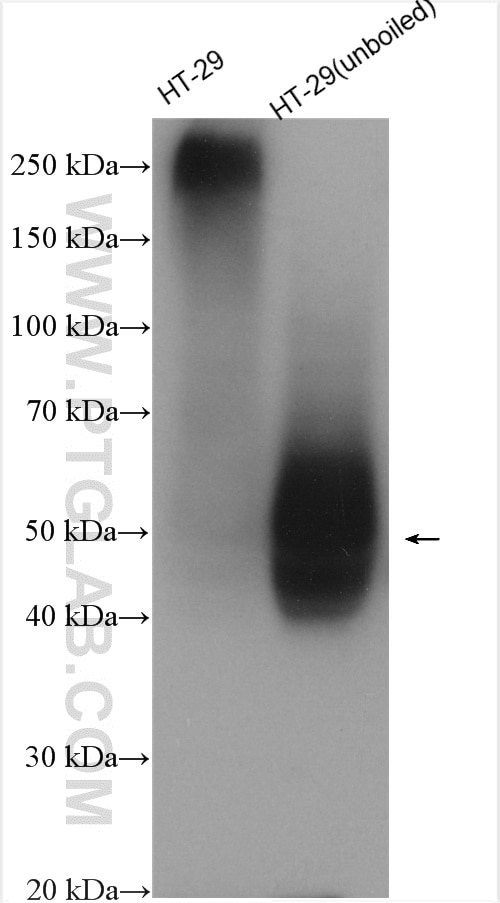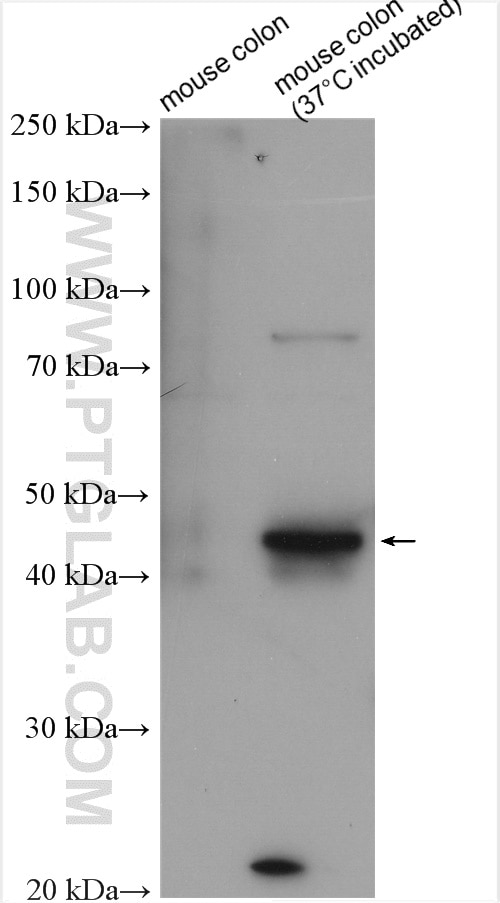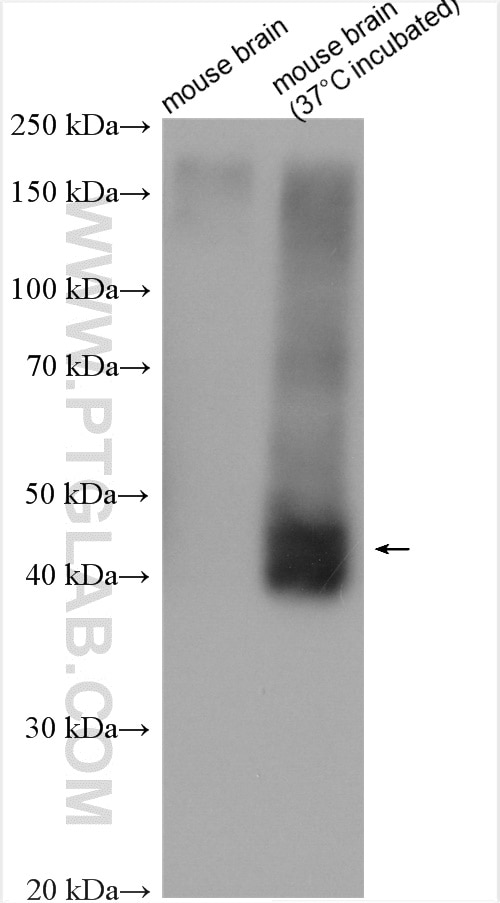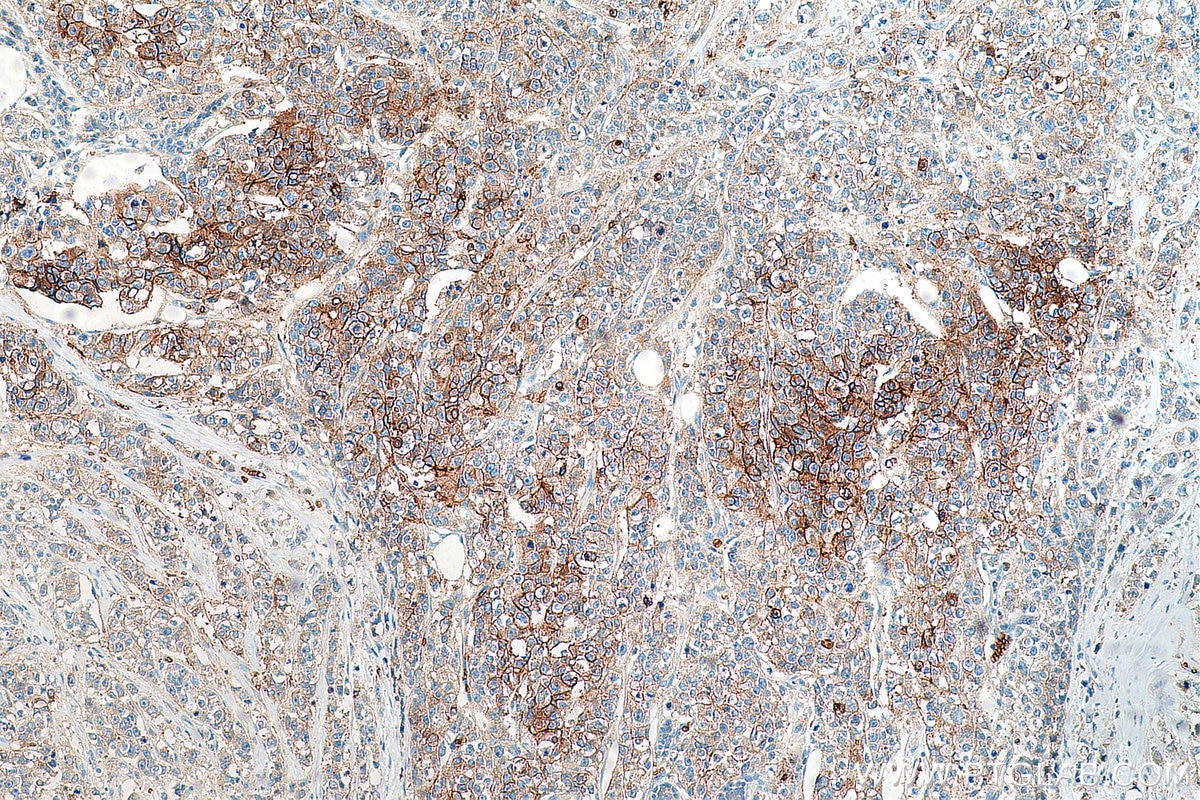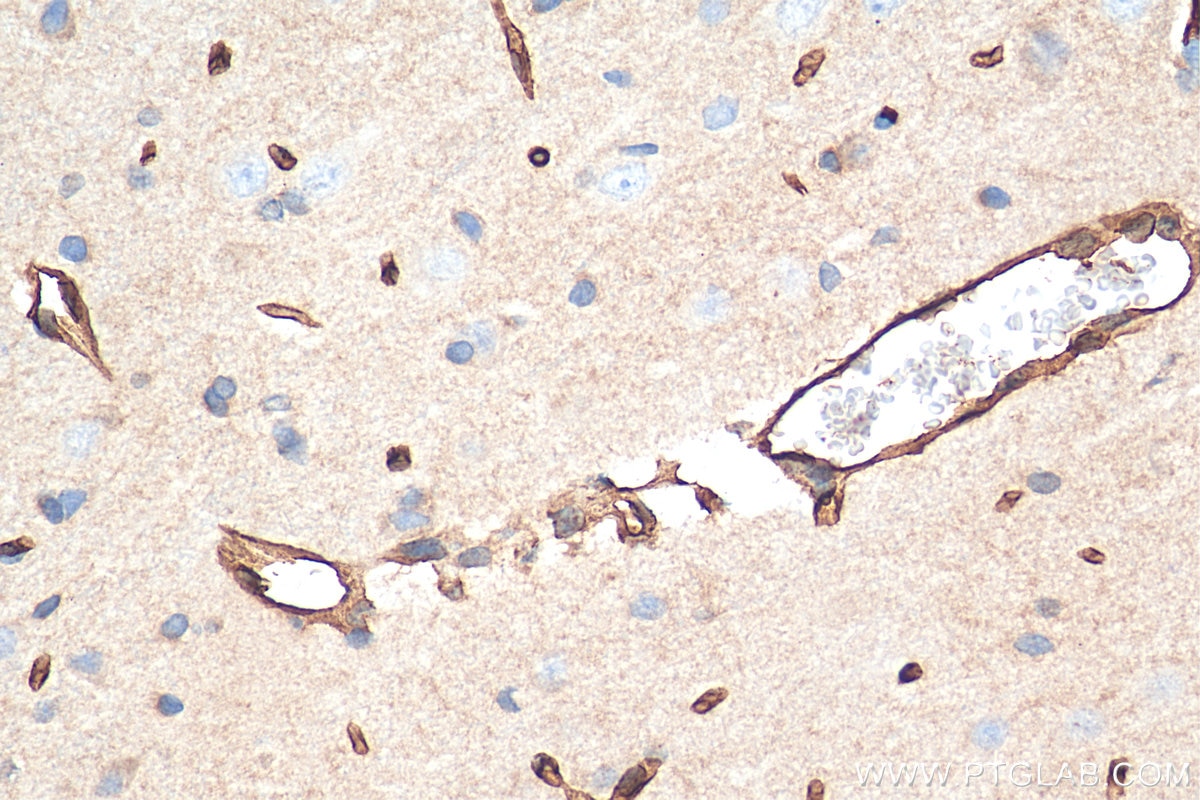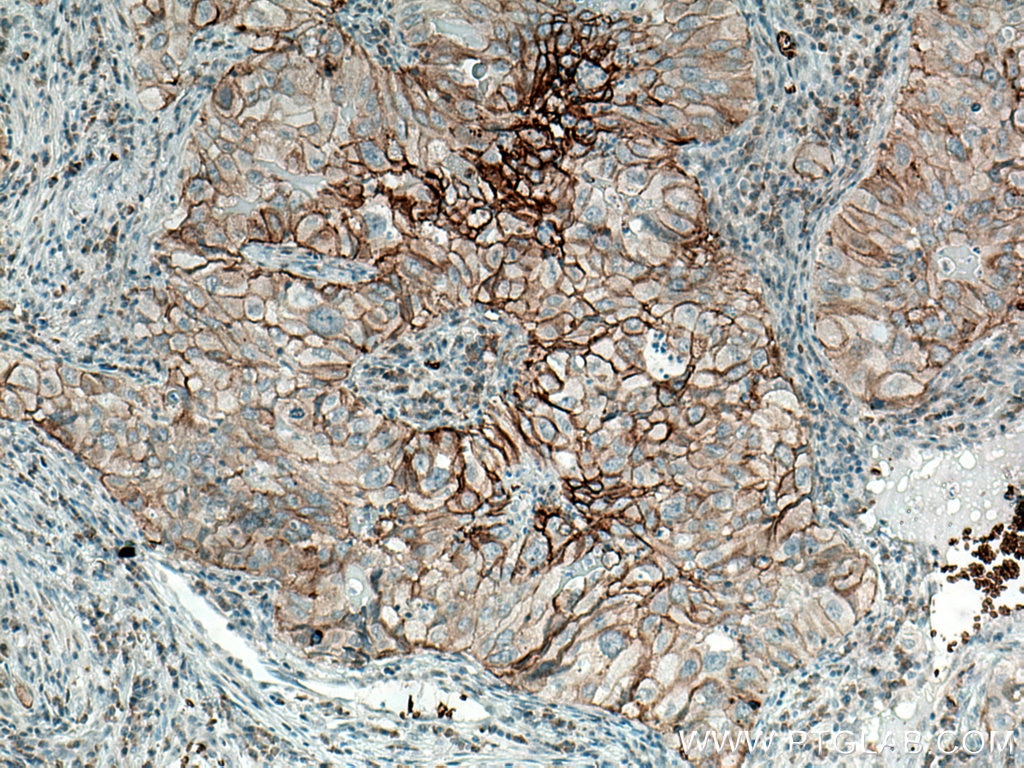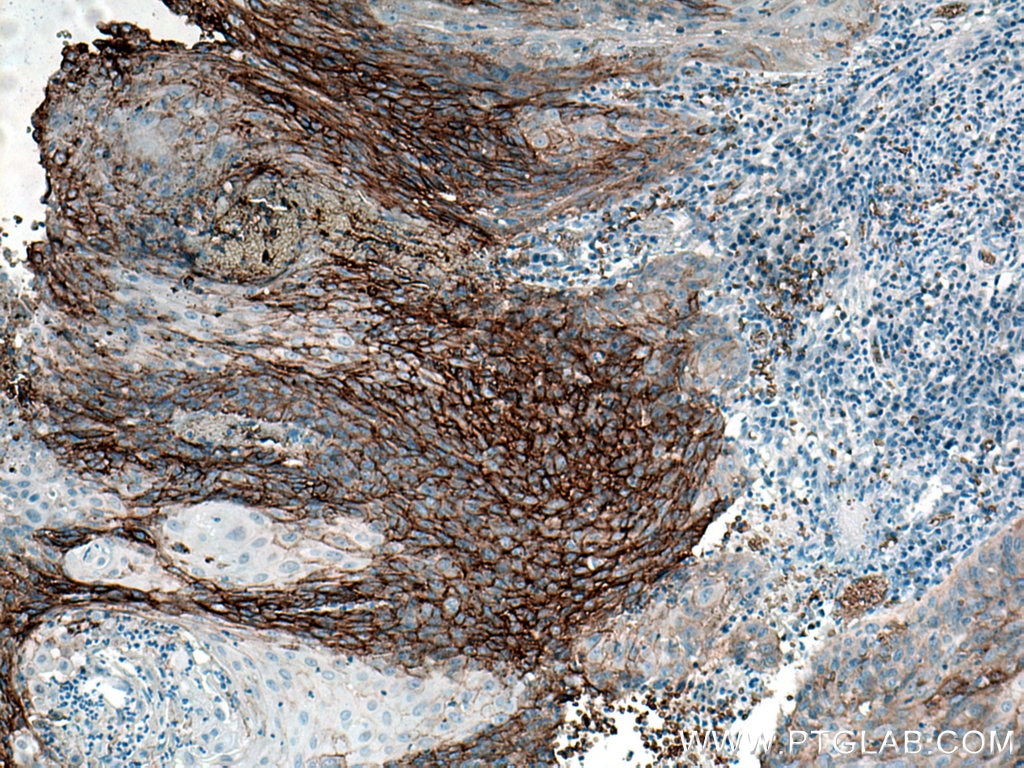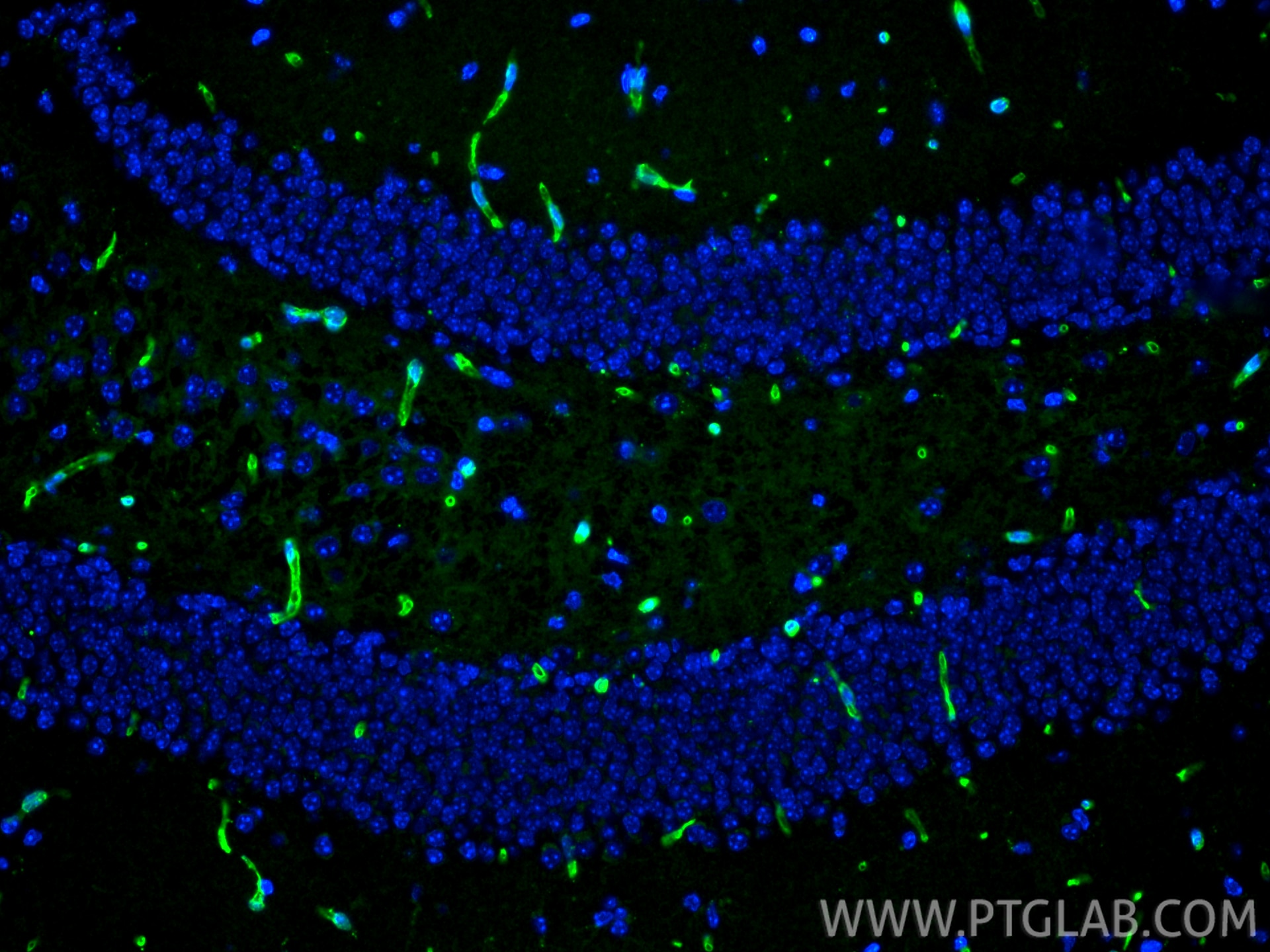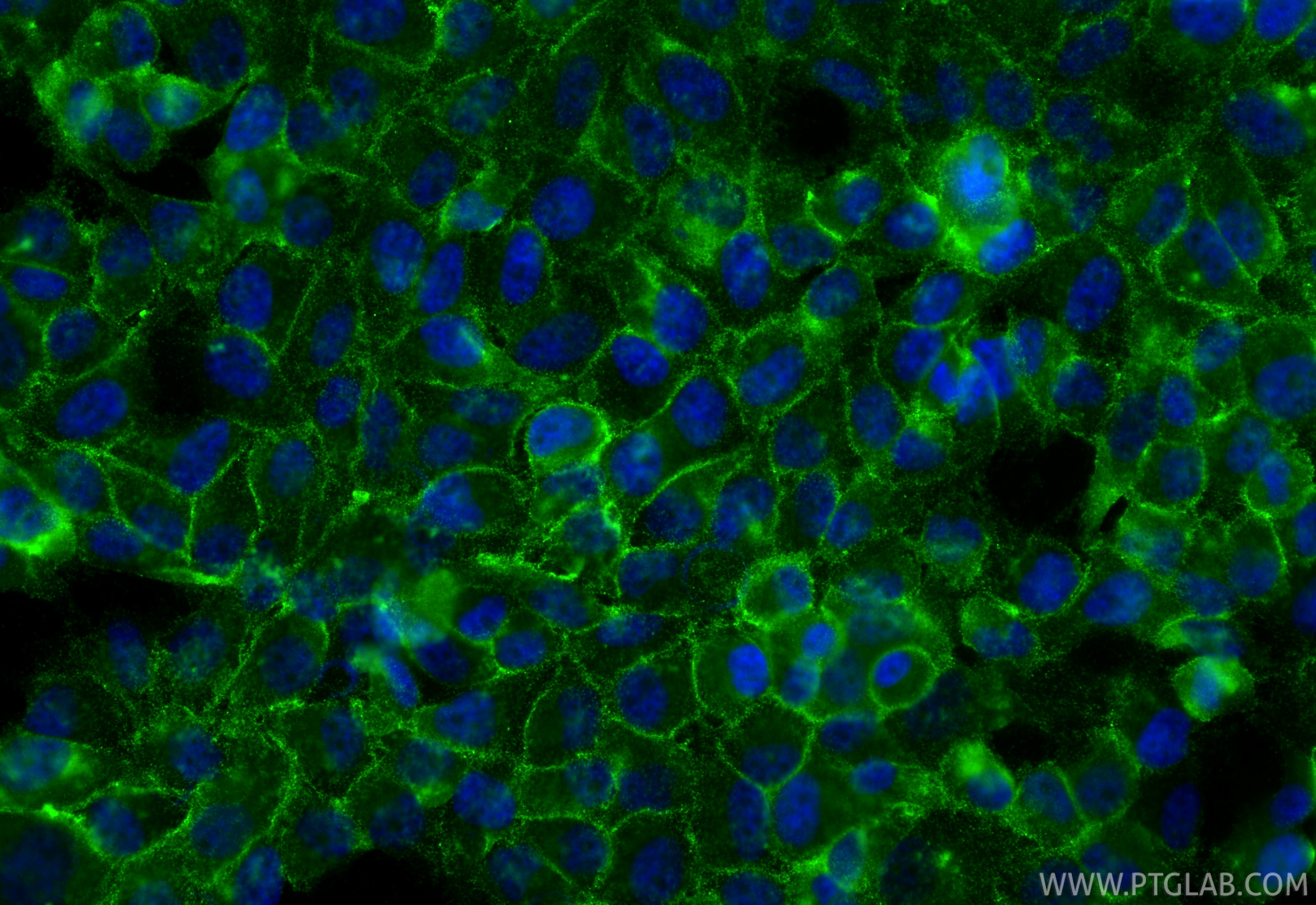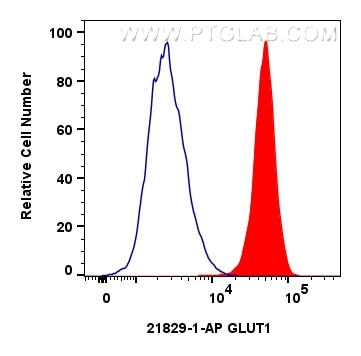Tested Applications
| Positive WB detected in | unboiled HT-29 cells, 37°C incubated mouse colon tissue |
| Positive IHC detected in | rat brain tissue, human lung cancer tissue, human cervical cancer tissue, human breast cancer tissue Note: suggested antigen retrieval with TE buffer pH 9.0; (*) Alternatively, antigen retrieval may be performed with citrate buffer pH 6.0 |
| Positive IF-P detected in | mouse brain tissue |
| Positive IF/ICC detected in | HeLa cells |
| Positive FC (Intra) detected in | HeLa cells |
For optimal WB detection with 21829-1-AP, we recommend to avoid boiling the sample after lysis.
Recommended dilution
| Application | Dilution |
|---|---|
| Western Blot (WB) | WB : 1:1000-1:8000 |
| Immunohistochemistry (IHC) | IHC : 1:2500-1:10000 |
| Immunofluorescence (IF)-P | IF-P : 1:50-1:500 |
| Immunofluorescence (IF)/ICC | IF/ICC : 1:200-1:800 |
| Flow Cytometry (FC) (INTRA) | FC (INTRA) : 0.40 ug per 10^6 cells in a 100 µl suspension |
| It is recommended that this reagent should be titrated in each testing system to obtain optimal results. | |
| Sample-dependent, Check data in validation data gallery. | |
Published Applications
| KD/KO | See 7 publications below |
| WB | See 282 publications below |
| IHC | See 56 publications below |
| IF | See 54 publications below |
| ChIP | See 1 publications below |
Product Information
21829-1-AP targets GLUT1 in WB, IHC, IF/ICC, IF-P, FC (Intra), ChIP, ELISA applications and shows reactivity with human, mouse, rat samples.
| Tested Reactivity | human, mouse, rat |
| Cited Reactivity | human, mouse, rat, pig, rabbit, goat, lasiopodomys brandtii |
| Host / Isotype | Rabbit / IgG |
| Class | Polyclonal |
| Type | Antibody |
| Immunogen |
CatNo: Ag16282 Product name: Recombinant human SLC2A1,GLUT1 protein Source: e coli.-derived, PGEX-4T Tag: GST Domain: 216-280 aa of BC121804 Sequence: INRNEENRAKSVLKKLRGTADVTHDLQEMKEESRQMMREKKVTILELFRSPAYRQPILIAVVLQL Predict reactive species |
| Full Name | solute carrier family 2 (facilitated glucose transporter), member 1 |
| Calculated Molecular Weight | 492 aa, 54 kDa |
| Observed Molecular Weight | 45-55 kDa |
| GenBank Accession Number | BC121804 |
| Gene Symbol | GLUT1 |
| Gene ID (NCBI) | 6513 |
| RRID | AB_10837075 |
| Conjugate | Unconjugated |
| Form | Liquid |
| Purification Method | Antigen affinity purification |
| UNIPROT ID | P11166 |
| Storage Buffer | PBS with 0.02% sodium azide and 50% glycerol, pH 7.3. |
| Storage Conditions | Store at -20°C. Stable for one year after shipment. Aliquoting is unnecessary for -20oC storage. 20ul sizes contain 0.1% BSA. |
Background Information
Glucose transporter 1 (GLUT1), also known as solute carrier family 2, facilitated glucose transporter member 1 (SLC2A1), is a uniporter protein responsible for the transport of glucose in many cell types and across the blood-brain barrier.
What is the molecular weight of GLUT1? Is GLUT1 post-translationally modified?
There are two forms of GLUT1 transporter that differ in their molecular weight. The 45-kDa form is found in glial cells, while the 55-kDa form is present in the endothelial cells regulating glucose transport over the blood-brain and blood-tissue barriers (PMID: 9630522). N-glycosylation of asparagine at position 42 is the only known post-translation modification of GLUT1 (PMID: 3839598).
What is the subcellular localization of GLUT1?
Glucose transporters, including GLUT1, are multiple-pass integral membrane proteins. GLUT1 is present at the plasma membrane but is also a subject of recycling between plasma membrane and endosomes.
What molecules can be transported by GLUT1?
The main substrate of GLUT1 transport is glucose, but it can also transport galactose, mannose, glucosamine, and reduced ascorbate.
What is the tissue expression pattern of GLUT1?
GLUT1 is expressed by many cell types but the highest levels are observed in erythrocytes and in the central nervous system (astrocytes). GLUT1 is responsible for glucose transfer across the blood-brain and blood-tissue barriers, including placental transport.
Protocols
| Product Specific Protocols | |
|---|---|
| FC protocol for GLUT1 antibody 21829-1-AP | Download protocol |
| IF protocol for GLUT1 antibody 21829-1-AP | Download protocol |
| IHC protocol for GLUT1 antibody 21829-1-AP | Download protocol |
| WB protocol for GLUT1 antibody 21829-1-AP | Download protocol |
| Standard Protocols | |
|---|---|
| Click here to view our Standard Protocols |
Publications
| Species | Application | Title |
|---|---|---|
Adv Mater Supramolecular Hydrogel with Ultra-Rapid Cell-Mediated Network Adaptation for Enhancing Cellular Metabolic Energetics and Tissue Regeneration | ||
Int J Oral Sci Transcriptional activation of glucose transporter 1 in orthodontic tooth movement-associated mechanical response. | ||
ACS Nano Biomimetic Nanomedicine Targeting Orchestrated Metabolism Coupled with Regulatory Factors to Disrupt the Metabolic Plasticity of Breast Cancer | ||
Nat Commun Parvimonas micra promotes oral squamous cell carcinoma metastasis through TmpC-CKAP4 axis | ||
Neuron Sympathetic nerve-enteroendocrine L cell communication modulates GLP-1 release, brain glucose utilization, and cognitive function |
Reviews
The reviews below have been submitted by verified Proteintech customers who received an incentive for providing their feedback.
FH Mounika (Verified Customer) (01-08-2026) | Bands are very bright, antibodies under the microscope have enhanced the cells
|
FH Vanessa (Verified Customer) (11-12-2025) | I used the GLUT-1 antibody in 100 µm frozen mouse brain sections at postnatal days 12 (P12) and 30 (P30). The antibody performed exceptionally well, producing strong, clean, and highly specific labelling of blood vessels throughout the brain. The signal was robust across the full depth of the thick frozen sections, with excellent penetration and minimal background. Vascular structures were sharply defined, and staining was consistent between developmental stages, allowing for reliable comparison of endothelial patterns at P12 and P30. The antibody showed excellent reproducibility and did not require extensive optimization beyond standard blocking and washing steps. Overall, the GLUT-1 antibody is an outstanding marker for endothelial cells in thick frozen brain tissue. It provides bright, specific, and reproducible staining, making it ideal for both developmental and structural studies of the cerebral vasculature. Pros: Excellent signal-to-noise ratio Strong and specific vascular labeling Good penetration in 100 µm frozen sections Highly consistent across ages and samples Cons: None observed
|
FH Marco (Verified Customer) (07-04-2024) | Nice Westernblots in NRVCMs
|
FH Hua (Verified Customer) (02-14-2023) | Good antibody working for WB with mouse liver samples. However, boiling mouse colon and brain tissues results in no band observed.
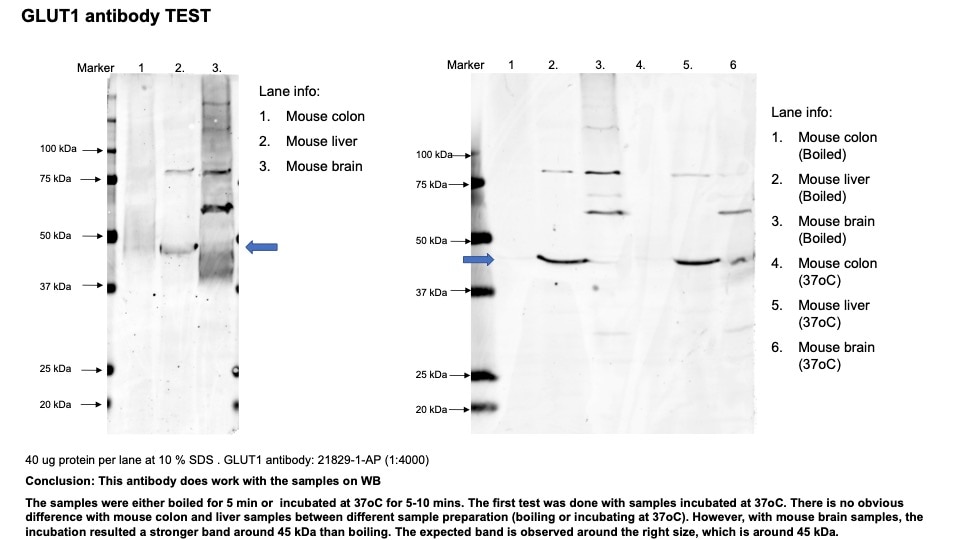 |
FH William (Verified Customer) (10-26-2021) | Very clear staining in IHC in rat brain tissue (Wistar) at a concentration of 1:100, very well localised to blood vessels. Not tested yet at different concentrations
|
FH Bastien (Verified Customer) (08-19-2020) | Staining of B cells from mice bone marrow after cytoplasmic permezbiliation. The cells were first fixed and permeabilized with intracellular fix and perm set from ebioscience and then stained with 1 µl/ million cells with Glut-1 antibody (21829-1-AP) during 50min After, a seconde staining was performed with 0,1µl/million cells of F(ab')2-Donkey anti-Rabbit IgG (H+L), PE, Secondary Antibody from invitrogen. In blue secondary antibody alone and in red primary (21829-1-AP) +secondary antibody
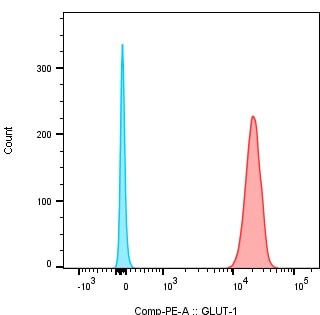 |
FH Susan (Verified Customer) (11-19-2019) | 20ug of HeLa cells overexpressing Glut1-GFP. Blocked with 5% milk in 0.1% TBST and incubated overnight at 4 degrees with rocking.
 |
FH Kishor (Verified Customer) (12-13-2018) | I got good results in cultured cells but I could not see any results with rat liver protein.
|

